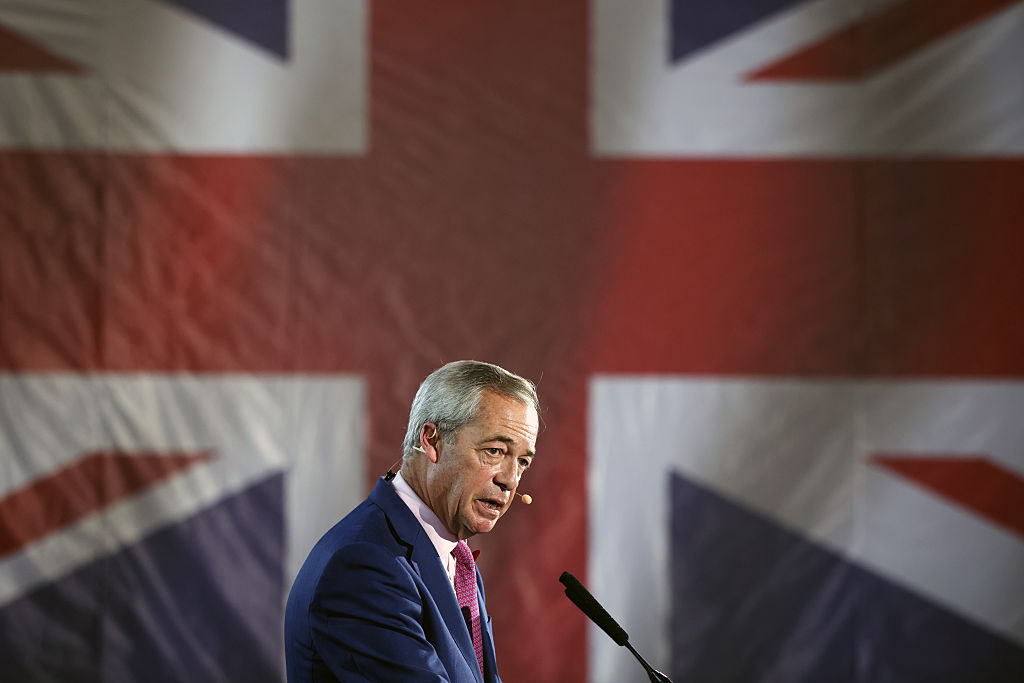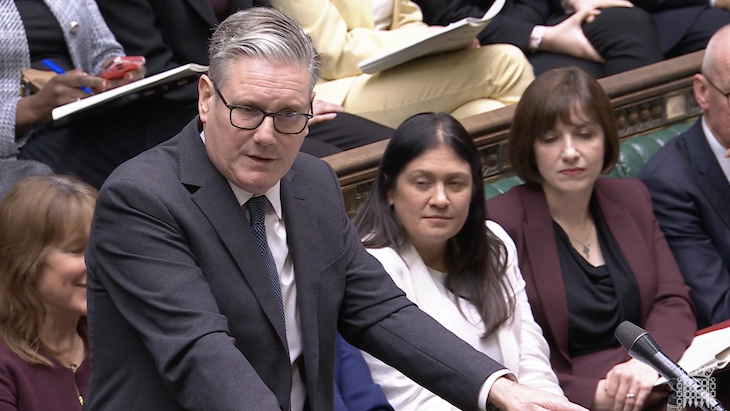Nigel Farage is the perfect folk devil for the British liberal left. He is robustly patriotic, cheerfully irreverent about modern pieties, and a Barbour-wearing libertarian smoker and beer-drinker. He represents – in both the literal and figurative sense – the Britain that the Sensible classes dislike and ignore and would like to see consigned to irrelevance: a Britain made up of ambitious City boys, the aspirational middle class, farmers, left-behind coastal towns and small business owners.
Perhaps I am old-fashioned, but there is something rather feeble and underhand about playing the informer on contemporaries from your schooldays
What makes it worse for them is that none of their attacks seem to stick. Reform are comfortably the single most popular party in Britain, with some polls giving them a seven or eight point lead and others putting them as far as 15 points ahead.
And so the Guardian has fallen back on an old favourite line of attack: the suggestion that, as a schoolboy at Dulwich College, Farage said some naughty words. Similar allegations have been dredged up before. As long ago as 2013, Channel 4 obtained a letter sent to the head of the college in 1981 objecting to Farage’s appointment as a prefect, on the grounds that he held ‘racist and neo-fascist views’. This time round, we have new accusations of racial bigotry, based on vague recollections of nastiness from old schoolfellows, with anti-Semitism added to the charge sheet.
The Guardian calls the comments ‘deeply shocking’ and have illustrated their reporting with a deliberately sinister-looking picture of Farage smoking a cigar (boo, hiss!) with a sneer of cold command on his face. The Prime Minister, at the despatch box of the House of Commons, has demanded that Farage explain himself. To be frank, given the actual content of the Guardian story, this is a hysterical over-reaction. It is hardly news that teenage boys make inappropriate comments to one another, pushing the boundaries of decency and good taste, and that this can be unpleasant for those on the receiving end. Having spent seven years as an inmate at an all-boys’ school myself, I have no illusions about the refinement of adolescent males. I blush to recall some of the jokes we told each other and the comments we made. It is revealing that some of the Old Alleynians who spoke to the Guardian about Farage’s school career contradicted the image of a menacing bully. ‘Others who knew Farage then remember he was bumptious, rude, provocative and enjoyed being the centre of attention, but do not recall the [racist and anti-Semitic] behaviour.’ Reading between the lines, and reflecting on my own experience, I suspect that Farage’s boisterous attention-seeking and sense of the outrageous was difficult to handle for some of the more sensitive boys, even though little real malice was involved.
It is also important to recall that Farage is 61 years old. He left school in the year the Falklands war took place. We are talking about behaviour from almost half a century ago, when social norms were very different and there were not the same sensitivities around racially-charged language. It is absurd for this to be an issue in national politics in 2025. Even assuming that Farage’s accusers are entirely right, that they have crystal clear recollection of conversations that took place while Jim Callaghan was in office, it would not establish anything of real significance except that the Reform leader was an intermittently obnoxious schoolboy who had a lot of growing up to do – a category to which most men will have belonged, at some time or another, between the ages of 12 and 18.
A cynic might even suspect that, in an era of search engines and AI, Farage’s media enemies know exactly what they are doing by placing online stories that conflate his name with ‘racism’ and ‘anti-Semitism’. I don’t claim to understand the dark arts of search engine optimisation, but an awful lot of mud is going to be flung at Farage over the next few years. He is Public Enemy Number One of a dying centrist regime, after all.
Perhaps I am old-fashioned, but there is something rather feeble and underhand about playing the informer on contemporaries from your schooldays. In the case of a really vicious and unrepentant bully, there might be a case for spilling the beans. But the latest Farage denunciations are simply a political hatchet job gussied up with innuendoes. There are plenty of chaps I don’t remember very fondly from my own seven-year stretch, but it would not occur to me to attempt to sabotage their professional lives, 25 years after we shook the dust from our feet. It might be tempting to remind the world that an old acquaintance who is now stridently right-on told me a string of racist jokes in the late 1990s, but there has been a lot of water under a lot of bridges since then. Neither of us are quite the person we were; life has knocked off a few of the sharp edges. To recount those jokes as isolated incidents would not be a fair portrayal of his character or his personality as it was then, or – more importantly – as it is now.
In a way, Reform can take heart from this latest half-hearted attempt to resurrect ancient history as a weapon against them. It demonstrates, among other things, the sheer exhaustion of the post-1997 establishment. The cupboard is bare; they have few arguments to make and few remaining options for resisting the inevitable reckoning. Instead, we get the same old worn-out smears about racism. But that weapon doesn’t work as well as it once did. Like antibiotics, overuse has rendered it ineffective.







Comments